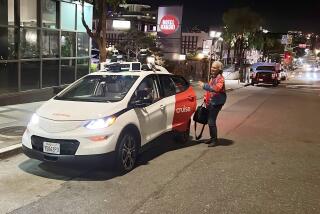Razor Sues Rivals, Alleging Patent Infringement
- Share via
Even as shiny aluminum scooters head to the top of Christmas gift lists, the biggest seller of the toys filed a lawsuit in U.S. District Court in Los Angeles late Wednesday charging 15 competitors with a combination of patent and trade infringement.
At stake is several hundred million dollars in expected sales between now and year-end.
Razor USA, the Cerritos-based importer of the popular $100 scooter, wants the federal court in Los Angeles to block competitors from selling similar devices after it was awarded a patent Tuesday for a design component of its hot toy.
In its lawsuit, Razor said several companies copied its patented brake system. Others have copied the look of the scooter, including its oval foot-grip pad on the scooter’s base, its polished aluminum frame and translucent-colored wheels.
Most of the targets of the lawsuit are in Southern California, including K2, Variflex, Gen-X Sports Inc. in Orange County and ASA Products in Industry.
The two-wheel Razor scooters have become a ubiquitous fixture of the sidewalk set since J.D. Components of Taiwan first began exporting the brand to the United States in March 1999. With the exception of sales through retailer Sharper Image, Razor USA has the exclusive contract to market and distribute the J.D. Components scooter in the United States.
Boys and teens have turned the scooters into a retailing rage. Sharper Image stores are selling the Razor scooters at a rate of $6 million to $7 million a month, and the company said Thursday that the scooters were largely responsible for third-quarter sales rocketing a staggering 68% to $97.4 million.
Similarly, Los Angeles sporting goods manufacturer K2 Inc.--one of the companies named in the Razor suit--said last month that its 37% gain in third-quarter profit was helped in part by sales of its Kickboard scooter.
And scooter sales are expected to be even stronger in the fourth quarter as they have become the must-have toy of the Christmas season since Sony Corp. said it would not be able to ship enough of its much-anticipated PlayStation2 video-game consoles to the United State to meet demand in time for the holidays.
Though they are very different products, both the $300 PlayStation 2 and the scooters, which typically range from $50 to $300, are marketed as high-priced toys for boys and young men.
With Sony hampered by supply and manufacturing problems, analysts and toy industry executives expect scooters to help plug a gap created by the lack of a Christmas season fad such as last year’s Pokemon-themed toys.
“We are already seeing some of the major retailers leading their advertising with Razors because there are not enough PlayStations to sell,” said Carlton Calvin, president of Razor USA.
Retailers such as Toys R Us like to pick a hot toy to feature in their marketing campaigns to draw customers to their outlets.
The scooters have become commonplace at outlets from Sports Chalet to convenience stores, where it’s not unusual to see Razor knockoffs hanging from above the soda machine. Variflex Inc., a Moorpark distributor of in-line skates and one of the companies named in the Razor lawsuit, sells its Stinger model for $49.95.
Razor, which believes it has more than 50% of the market, expects to sell as many as 2 million scooters by Christmas. That translates into about $200 million in business at the retail level. That does not include the Sharper Image sales, which fall under a separate sales contract between Sharper Image and J.D. Components.
In filing its lawsuit, Calvin said Razor was attempting to “go after the most significant players. To sue the dozens of other companies would be a vast effort.”
Executives at both K2 and ASA said their scooters don’t violate Razor’s patent. Indeed, K2’s primary scooter has three wheels and is sold mostly in Europe, where Razor does not have an exclusive sales agreement, said John Rangel, the K2’s senior vice president of finance.
For the most part, K2 has avoided the American market, instead focusing its efforts on sales of $150 to $300 scooters abroad, where they are used by young adults as a supplement to public transit, Rangel said. K2 was concerned about getting into what the company perceived as a toy market for scooters in the United States that would be subject to the consumer fickleness that characterizes fads.
Russ Anderson, sales director for ASA Products, said he has not seen the lawsuit and that his company has not heard from Razor USA. Anderson, however, said ASA’s Aggressor scooter has its own patent and features at least three significant differences from the Razor, including its braking system, suspension and handlebars.
“We think maybe they included us in their attempt to stop the knockoffs,” Anderson said.
While trying to enforce a patent on something as basic as a scooter might be challenging, Nicolas Barzoukas, a Houston intellectual property rights attorney, said Razor USA might have some success attacking the similar look of other scooters.
“You cannot copy distinctive aspects of another person’s product in such a way to confuse the public,” Barzoukas said. “A soda drink company, for example, could not copy the shape of a Coca-Cola bottle.”
Defending its brake system might be more difficult, the attorney said.
“It will come down to the obviousness of the design,” he said. “The defendants will try to claim that it is so obvious it doesn’t deserve a patent while the company will argue that if it was so obvious, why didn’t somebody come up with it before they did.”







